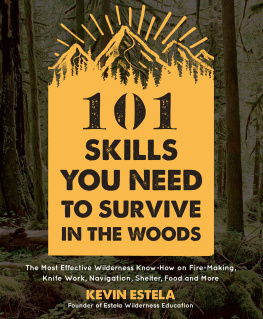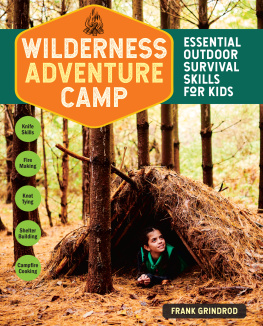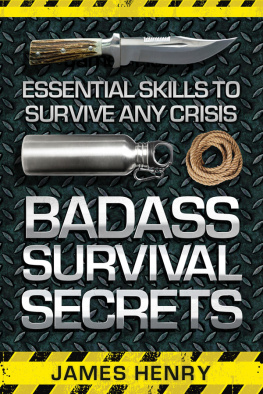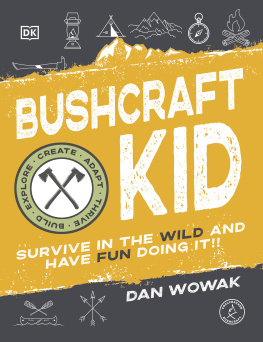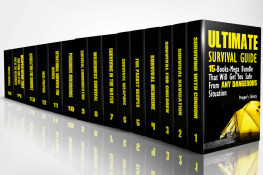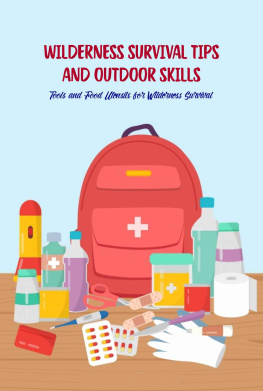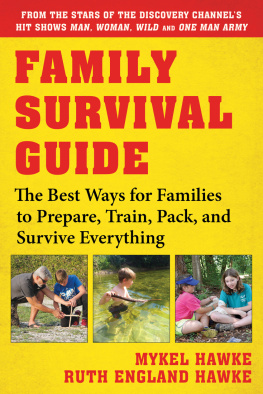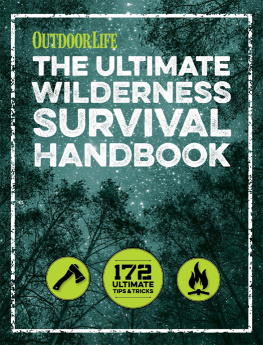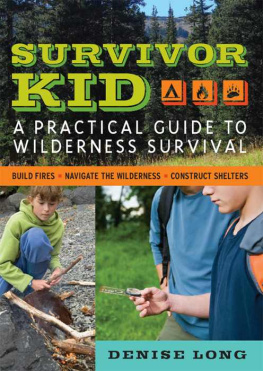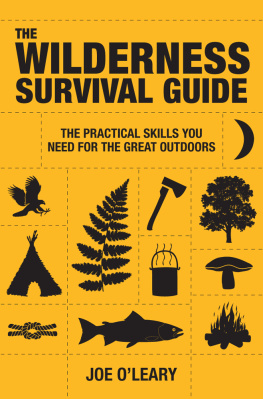Contents
Guide


The Most Effective Wilderness Know-How on Fire-Making, Knife Work, Navigation, Shelter, Food and More
KEVIN ESTELA
Founder of Estela Wilderness Education

The author and publisher have provided this e-book to you for your personal use only. You may not make this e-book publicly available in any way. Copyright infringement is against the law. If you believe the copy of this e-book you are reading infringes on the authors copyright, please notify the publisher at: http://us.macmillanusa.com/piracy.
DEDICATED TO
My father, Jose Estela, MD, my greatest inspiration; my wilderness-survival mentor Marty Simon from the Wilderness Learning Center, who honed my skills and became one of the greatest friends of my life; and Pamana Tuhon Christopher Sayoc Sr., who gave me an invaluable mind-set and training, welcoming me into the Sayoc Kali tribe. The knowledge, skill sets and direction you three have given me are the stars I continue to follow and value so greatly.


A quick drive to the store can turn into a survival situation. At any time, you can find yourself in a life-threatening emergency that will have one of two outcomes. You will either address the problem in front of you and survive, or you will fail and die.
For some, the idea of the wilderness represents a welcome escape from their reality, and yet others view the wilderness as dangerous and unknown. What tempers your perspective of the wilderness is knowledge. The great Japanese swordsman Miyamoto Musashi stated, The purpose of todays training is to defeat yesterdays understanding. The knowledge found in this book is meant to empower you and provide you with the hard skills you need to survive.
Skills inspire confidence. A strong swimmer would not hesitate to consider diving into the water when their pleasure boat takes on too much water. The life of the party endowed with the gift of gab would gladly take the microphone and deliver an impromptu speech at a wedding. A skilled grappler would have no issue escorting the drunk uncle out of the backyard at the family barbecue. All of these scenarios would be very different if the protagonists were not skilled. Many survival resources provide excellent theoretical knowledge but are light on practical skills. Some survival schools want their students to adopt their spirituality and become clones of the schools founder. I want the readers of this book to become both knowledgeable and skilled. Religion and spirituality are deeply personal and not the focus of this work. As for becoming like me, adopt a similar mind-set, skill set and physicality, but dont worry about dressing or talking like I do.
I place great value on learning, and I have dedicated my life to educating. This book is filled with information, and there are additional great print and online resources you can use to supplement your education; however, I recommend you seek out a qualified instructor and training group that will take your skills development as seriously as you do. Find a school or training program that fits your style, and dont change yourself to fit theirs. Do not let this book, as proud as I am of it, be your sole teacher. Books do not replace human interaction and instruction.
Keep in mind as you read this book that there were plenty of people who died for these skills. Many emergency and survival lessons have been paid for in blood, frostbitten fingers, broken bones, exposure and death. We must learn from the mistakes made, make adjustments and keep history from repeating itself in our lifes timeline. As you read about the various skills in the following chapters, think about those who made the ultimate sacrifices and those who survived and carried these skills with them to pass on to the next generation. I did not invent these skills, but I have adopted them and love passing them on to others. I encourage you to find at least one skill you are proficient in and share it with someone you care about. Keep these skills alive by teaching them. Perhaps that deed will repay you by keeping you alive at some point in your travels.
SURVIVAL MIND-SET AND READINESS
NATURAL FEARS AND HOW TO MITIGATE THEM
You dont need to be a psychologist to understand humans have natural fears. Simply observe enough novices spending the night in the woods for the first time, and youll see plenty of fears come to the surface. Fear is an emotional response, and it can have a paralyzing effect on us. While a little fear can motivate us and help trigger the fight instinct, too much fear can signal our brains for flight or freeze. In a survival situation, when your mind is left to wander to dark places, its natural for the emotional roller coaster to take your thoughts for a wild ride. Your desire to survive may be overpowered by the fear of your situation. When you dont have to worry about the day-to-day normal routine of your life and youre presented with new stressors, the pressure and reality of your abnormal survival situation can wreak havoc on your emotional well-being.
Since these fears impact the outcome of our survival, how do we manage them and keep a level head? We must understand our emotions are powerful and seek out logical thinking instead. Logic requires no emotional input; there is no place for it. We need to think about why we fear what we fear. If we think about our fears this way, we can create a plan to deal with them. Logical thinking is the enemy of emotional responses to stress like fear. Rather than wait for an emergency to put us through stress, we can make our training simulate what we may encounter. We dont have to wait for something to happen to us to experience it for the first time. Even if we can experience something in our minds, the mental repetition of visualizing preframes our minds for action. We can embrace strength and power by facing our fears and coming closer to them with each day. We can harness our fears and turn them into something else.
POSITIVE MENTAL ATTITUDE (PMA)
My father knew the power of optimism and humor, and he instilled both of them in me at a young age. He taught me to laugh off hardship and setbacks and to keep driving forward. Self-deprecation is a great coping mechanism, and being able to smile through hardship has tempered my resolve. It has been an integral part of the hard-fought success Ive experienced in life.
The opposite of positivity is negativity, and those who would rather focus on the negative invite toxicity into their minds. Positive thinking, on the other hand, is what it takes to fight off the gravity of your emergency or survival situation. Positive mental attitude (PMA) was referenced in many survival manuals I read as a teenager, and it is just as relevant today as it has been over the years.

